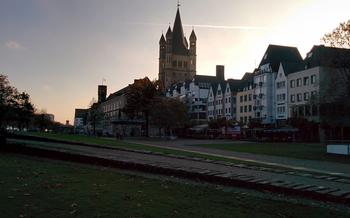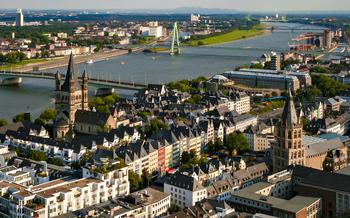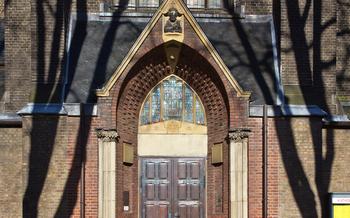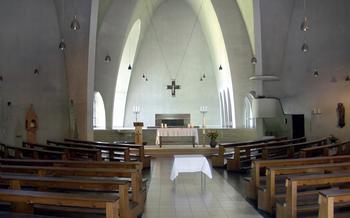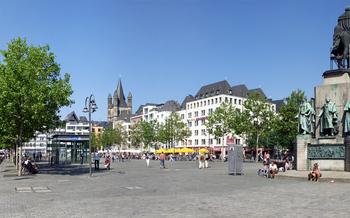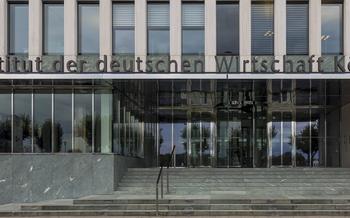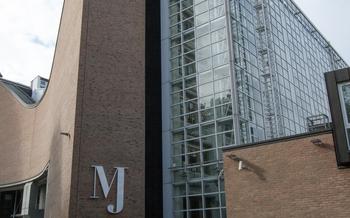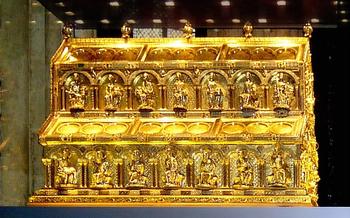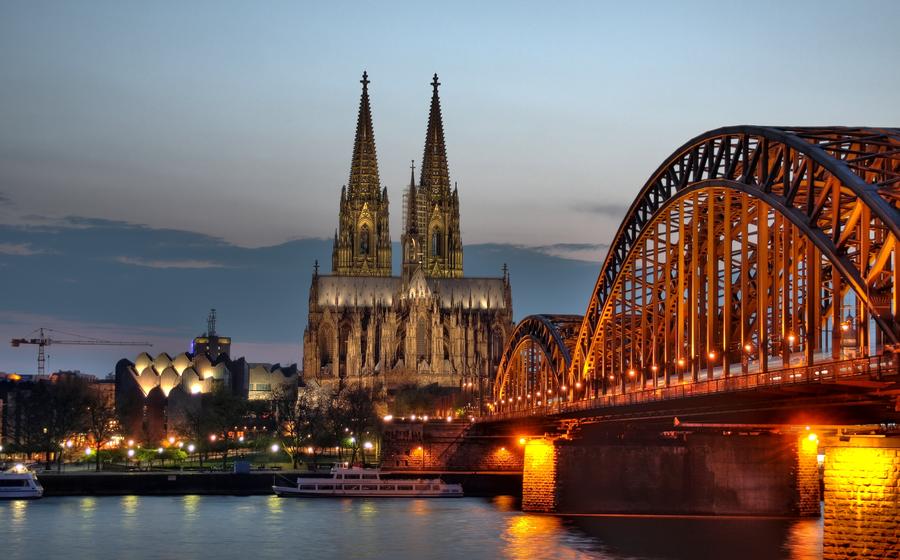
NS Documentation Centre of the City of Cologne
- A Journey Through History
- The "Stolpersteine" Project: Commemorating Individual Victims
- The Mikveh
- The Jewish Cemetery in Bocklemünd
- The Museum of Applied Arts
- The NS Documentation Centre Library
- Guided Tours and Educational Programs
- Accessibility and Facilities
- Events and Commemorations
- Insider Tip:
A Journey Through History
The NS Documentation Centre's permanent exhibition, titled "Cologne under National Socialism," offers a comprehensive and immersive journey through the city's history during the Nazi era. It utilizes interactive displays, multimedia presentations, and various thematic sections to shed light on different aspects of Nazi rule in Cologne.
Visitors can explore sections dedicated to the rise of National Socialism, the persecution of Jews and other minorities, the propaganda and terror apparatus, forced labor, resistance and opposition, and the liberation of Cologne. Personal stories and testimonies from victims and survivors bring a human dimension to the exhibition, allowing visitors to connect with the individual experiences of those who suffered under Nazi tyranny.
The exhibition encourages critical engagement with history, prompting visitors to reflect on the mechanisms of power, discrimination, and collective responsibility. It serves as a reminder of the horrors of the past and the importance of promoting tolerance, understanding, and respect for human rights.
The "Stolpersteine" Project: Commemorating Individual Victims
The "Stolpersteine" (stumbling stones) initiative is a powerful and moving tribute to the individual victims of Nazi persecution. Conceived by German artist Gunter Demnig, these small, brass cobblestones are embedded in the pavement outside the former homes of those who were deported or murdered by the Nazi regime. Each stone bears the victim's name, date of birth, and fate, serving as a permanent reminder of the human cost of Nazi tyranny.
In Cologne, there are over 2,000 Stolpersteine scattered throughout the city, each telling a unique story of suffering and loss. Visitors can follow the interactive map provided by the NS Documentation Centre to locate these poignant memorials and learn about the lives of the people they commemorate.
By placing these small stones in public spaces, the Stolpersteine project ensures that the victims of Nazi persecution are never forgotten. They serve as a constant reminder of the horrors of the past and the importance of standing up to hatred and intolerance in all its forms.
The Mikveh
The Mikveh, a Jewish ritual bath, holds a unique place among Cologne's Jewish heritage sites. Constructed in the 12th century, it is one of the oldest and best-preserved Mikvaot in Europe. Located in the heart of the former Jewish quarter, the Mikveh served as a sacred space for purification and immersion.
In 1956, during archaeological excavations, the Mikveh was rediscovered, revealing its remarkable state of preservation. Intact stone steps lead down to the water basin, which is still filled with fresh spring water. The Mikveh's walls feature niches and benches where bathers could prepare for immersion.
The Mikveh's survival through centuries of turmoil and destruction stands as a testament to the resilience of Jewish life in Cologne. It is a powerful reminder of the community's rich traditions and rituals, even in the face of adversity. Today, the Mikveh serves as a living memorial to the vibrant Jewish culture that once flourished in the city.
The Jewish Cemetery in Bocklemünd
Situated in the Bocklemünd district of Cologne, the Jewish cemetery holds a poignant history and serves as a reminder of the city's vibrant Jewish community. Established in 1880, it underwent several expansions to accommodate the growing Jewish population. Today, the cemetery stands as a tranquil haven, its tombstones silently narrating the stories of those who once called Cologne home.
Notable burials include prominent members of the Jewish community, such as the rabbi and scholar Abraham Frank. His elaborate tombstone, adorned with intricate carvings and Hebrew inscriptions, pays tribute to his contributions to Jewish life in Cologne. Other notable figures laid to rest here include the businessman and philanthropist Leopold Koppel and the artist Max Stern.
The cemetery also features several monuments dedicated to the victims of Nazi persecution. One such monument is the mass grave of 16 Jewish men who were brutally murdered by the SS in 194Their remains were discovered after the war and interred in the cemetery, a stark reminder of the atrocities committed during the Holocaust.
Preserving and commemorating Jewish burial sites like the Bocklemünd cemetery is of utmost importance. These sacred spaces not only serve as resting places for the deceased but also stand as testaments to the resilience and enduring spirit of the Jewish community. They remind us of the rich cultural heritage that was nearly extinguished during the Holocaust and the responsibility we have to ensure that such horrors never happen again.
The Museum of Applied Arts
The Museum of Applied Arts (MAKK) is a treasure trove of Jewish cultural heritage, housing a remarkable collection of Jewish ceremonial objects. These exquisite pieces, spanning centuries of history, offer a glimpse into the rich traditions and craftsmanship of the Jewish community. Visitors can admire intricately designed menorahs, elaborately decorated Torah pointers, and beautifully crafted ritual garments. The museum also hosts special exhibitions showcasing the works of Jewish artists and exploring various aspects of Jewish art and culture. Through its collection and exhibitions, the MAKK plays a vital role in preserving and celebrating the legacy of Jewish creativity and craftsmanship.
The NS Documentation Centre Library
The NS Documentation Centre houses an extensive library specializing in Nazi history and the Holocaust. The collection umfasst over 25,000 books, periodicals, and other resources, making it one of the most comprehensive collections on the subject in Germany. The library is open to the public and offers a wide range of materials for researchers, students, and the general public.
The library's holdings include a variety of primary and secondary sources, including books, articles, government documents, and personal testimonies. The collection is particularly strong in the areas of Nazi ideology, the persecution of Jews, and the resistance to Nazi rule. The library also has a growing collection of digital resources, including databases, online journals, and multimedia presentations.
The library staff is available to assist visitors with their research needs. They can provide guidance on finding materials, conducting research, and interpreting historical documents. The library also offers a variety of educational programs and workshops, which are designed to help visitors learn more about Nazi history and the Holocaust.
Guided Tours and Educational Programs
The NS Documentation Centre offers a range of guided tours to enhance visitors' understanding of the exhibits and the history they convey. These tours are conducted in various languages to cater to a diverse audience. Special tours are tailored for school groups, delving into age-appropriate topics and themes.
Educational programs and workshops are also available, providing a deeper exploration of specific aspects of Nazi history and the Holocaust. These programs are designed to foster critical engagement with history and human rights issues, encouraging participants to reflect on the lessons of the past.
By participating in guided tours and educational programs, visitors gain a deeper understanding of the atrocities committed during the Nazi regime and the impact it had on individuals and communities. These programs contribute to the centre's mission of promoting remembrance, education, and critical reflection on historical events.
Accessibility and Facilities
The NS Documentation Centre welcomes visitors from all backgrounds and abilities. It offers a range of accessibility features to ensure that everyone can have a meaningful and enriching experience.
For visitors with mobility impairments, the centre is fully wheelchair accessible, with ramps, elevators, and accessible restrooms. Guided tours in sign language are available upon request, allowing deaf and hard of hearing visitors to fully engage with the exhibits.
The centre also provides a variety of amenities to enhance the visitor experience. A cloakroom is available to store coats and bags, and a café offers refreshments and light meals. The on-site bookshop sells a wide selection of books, films, and other resources related to Nazi history and the Holocaust.
With its commitment to accessibility and inclusivity, the NS Documentation Centre strives to create a welcoming and supportive environment for all visitors. Whether you are a history buff, a student, or simply someone interested in learning more about this dark chapter in human history, the centre offers a wealth of resources and experiences that are both educational and thought-provoking.
Events and Commemorations
The NS Documentation Centre is not merely a static archive of history; it is a vibrant hub for events, lectures, and workshops that foster dialogue and reflection on the lessons of the past. Throughout the year, the centre hosts a variety of programs that delve into various aspects of Nazi history and the Holocaust. These events provide opportunities for visitors to engage with experts, participate in discussions, and gain a deeper understanding of the complexities of this dark chapter in human history.
Among the regular events held at the centre are lectures by renowned scholars, workshops on specific topics related to Nazi persecution, and film screenings followed by discussions. The centre also organizes commemoration ceremonies and observances on significant dates, such as the anniversary of Kristallnacht and Holocaust Remembrance Day. These events serve as solemn reminders of the atrocities committed during the Nazi regime and encourage visitors to reflect on the importance of remembrance and reconciliation.
By participating in these events and commemorations, visitors to the NS Documentation Centre can actively engage with the history presented in the exhibitions and gain a broader perspective on the impact of Nazi rule on Cologne and its people. The centre's commitment to education and remembrance extends beyond its physical walls, creating a space for critical dialogue and reflection that resonates long after a visit.
Insider Tip:
For a post-visit meal, I highly recommend the traditional German restaurant "Haxenhaus am Dom", located just a short walk from the NS Documentation Centre. Indulge in hearty local delicacies like crispy pork knuckle and sauerkraut while soaking in the historic ambiance of Cologne's Old Town.
To make the most of your visit, consider combining it with other historical sites in Cologne. The nearby Cologne Cathedral, a UNESCO World Heritage Site, is a must-see for its stunning Gothic architecture and rich history. You might also want to explore the Roman-Germanic Museum, which houses a vast collection of artifacts from Cologne's Roman past.
If you happen to be in Cologne during the summer months, don't miss the annual "Cologne Lights" festival, where the city's landmarks are illuminated in a dazzling display of lights. And if you're a fan of art, check out the Museum Ludwig, which boasts an impressive collection of modern and contemporary art, including works by Pablo Picasso and Andy Warhol.
Remember, the NS Documentation Centre is not just a place to learn about history; it's an opportunity to reflect on the devastating consequences of hatred and intolerance. Take your time, absorb the information, and let the stories of the victims touch your heart. Only through remembrance and education can we prevent such atrocities from happening again.
